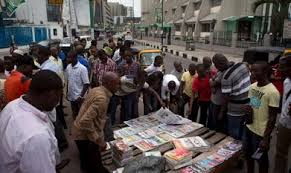The agitations for a totally new constitution to pave way for total reform of the country’s ailing and comatose systems and former President Olusegun Obasanjo’s statement that series of challenges currently confronting Nigeria are due to bad leadership are some of the trending stories in Nigerian newspapers on Friday.
|
The Guardian reports that the agitations for a totally new constitution to pave way for total reform of the country’s ailing and comatose systems may have hit the rock. At a public hearing on the review of the constitution in Abuja, yesterday, the Senate declared that An array of persons and groups, had sought a totally new constitution for Nigeria. Babalola, who described the 1999 Constitution as part of the problems of the country, advised The legal luminary expressed the need to empower different regions to effectively address the He said: “There is a very simple solution to the growing insecurity in the country and that is a new constitution. We need a new constitution where the different nations that were formed together can develop at their own pace. West was doing well during the old constitution, likewise the East and even the North but the one we are using now is managed by leaders who see politics as the only lucrative business.” Prominent among those that have clamoured for a new constitution is the founder of Afe Babalola University Ado-Ekiti (ABUAD), Afe Babalola (SAN). The Vanguard says that former President Olusegun Obasanjo on Thursday, once again blamed series of challenges currently confronting Nigeria on bad leadership, and thereby called on all Nigerians to join hands together towards taking the country to where God has created it to be. The former president said this in his remarks at the unveiling of a book titled: “The Man, The former President said, “God has created Nigeria to be a land flowing with milk and honey, but due to leadership failure, the country is wallowing of crises and problems”. He said, that Nigeria has been destined to lead the black race, but “failure of leadership” has impeded it from taking its place in the comity of developed nations. “Right now, it is a land flowing with bitterness and sadness. That is not what God wants this country to be”. The foreign portfolio investors injected N 78.31bn into the market from January to April this year, according to data from the Nigerian Exchange Limited. Foreign portfolio investment outflow includes sales transactions or liquidation of portfolio investments through the stock market, while the FPI inflow includes purchase transactions on the NSE (equities only), according to the bourse. The NGX, in its latest domestic and foreign portfolio report, said foreign outflow fell to N9.82bn in April from N20.28bn in March. Foreign investors withdrew N39.05bn in February, up from N30.79bn in January, according to the bourse. Total transactions at the bourse decreased by 30.01 per cent from N228.49bn (about $560.55m) in March 2021 to N159.93bn (about $389.84m) in April 2021. The total value of transactions executed by domestic investors in April outperformed transactions executed by foreign investors by about 64 per cent. A further analysis revealed that total domestic transactions decreased by 29.78 per cent from N187.85bn in March to N131.91bn in April. The Leadership says that Nigeria’s ‘Decade of Gas’ initiative is currently being threatened by huge infrastructure gap that would require about $40 billion funding to actualise. The Nigerian National Petroleum Corporation (NNPC) said that at least $40 billion in direct investments in basic infrastructure would be needed to achieve the federal government’s ambitious target, and assured that it was targeting between 7.4 billion cubic feet to 10 billion cubic feet of gas in the next couple of years. At a virtual forum organised by the Association of Local Distributors of Gas (ALDG), tagged, “The Decade of Gas: Unlocking Opportunities in the Domestic Gas Market,” the chief operating officer, Gas and Power, NNPC, Mr Yusuf Usman, noted that a major constraint in achieving local content through the programme are the difficult conditions placed by foreign lenders. According to him, the corporation expects to grow about 10 gas-based industries as it works towards the 10-year target. He added that the huge funds needed is based on the submissions NNPC has received from potential investors. He said about 39 thermal power plants were being targeted as opposed to the current 33. He added that, “in terms of benefits, we will generate 45,000 megawatts of power in terms of gas use, create massive employments and import substitution’. The Sun reports that the data obtained from the Access to Financial (A2F) 2020 survey findings published by Enhancing Financial Innovation & Access (EFInA) in Lagos yesterday, 51 percent of Nigerian adults used formal financial services from banks, microfinance banks, mobile money, insurance, or pension accounts, up from 49 per cent in 2018. This has largely been driven by growth in banking with 45 percent of Nigerians banked in 2020, up from 40 per cent in 2018, while only 64 per cent of Nigerian adults were financially included by the end of 2020. This meant that 36 percent of Nigerian adults, or 38 million adults, remained completely financially excluded. The report highlighted that large gaps in financial access remain for some of Nigeria’s most financially excluded groups even as women continued to be more financially excluded than men, with only 45 percent of them using formal financial services, compared with 56 percent of men. It said, “Adults in Northern Nigeria continued to be significantly more financially excluded than those in the southern zones, and rural adults are still more excluded than those in urban areas.
|
GIK/APA


